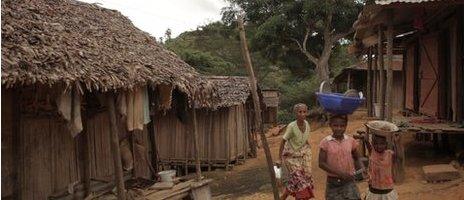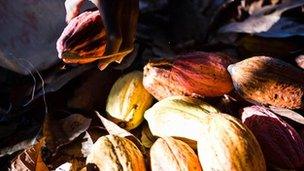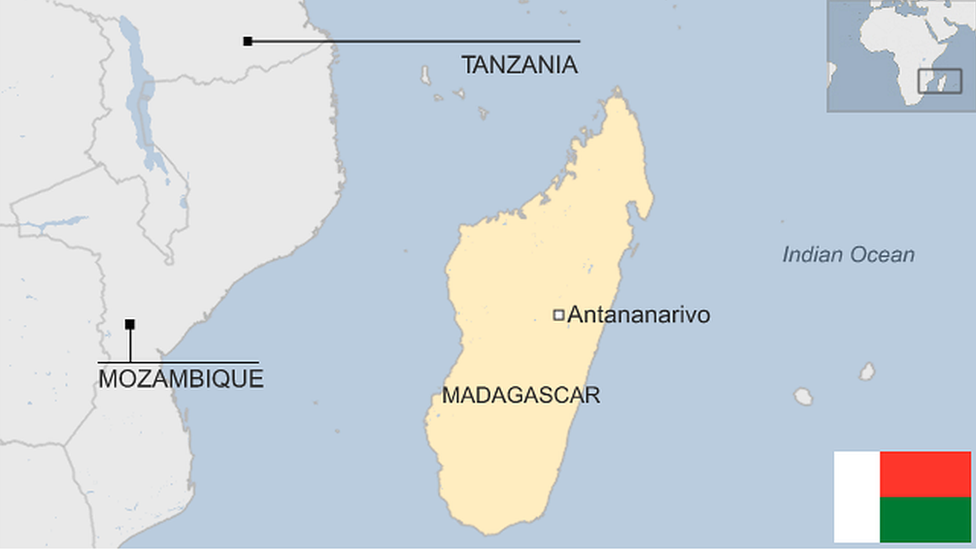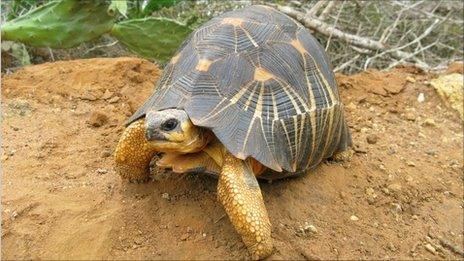Madagascar's luxury chocolate thieves strike fear into farmers
- Published
Navdip Dhariwal speaks to those affected by the bandits
It is nightfall in north-western Madagascar and fear is etched on the faces of farm workers as they gather in their remote village, Antanimandririna, to discuss a crisis: How to protect the world's sweetest crop from a growing number of armed bandits capitalising on the West's enduring love for fine chocolate?
Amory, the 62-year-old village head, explains the high levels of crime.
"We had just stocked all of our recent harvest in large wooden stores at the back of the houses, when we woke to find all the pods had gone - stolen," he says.
"The men arrived with guns and threatened the farmers - they came up through the forest and we have heard of other incidents in neighbouring villages that their stocks too have been looted."
Madagascar is home to some of the world's finest rich orange and red pods of cocoa, increasingly used today by Europe and America's finest chocolatiers.
Raw cocoa beans, used to make premium chocolate, have quite simply never been in higher demand.
A surge in appetite for high-end chocolate sourced from single-origin growers has created a frenzied rush for the "dark gold".
The craving for luxury chocolate has also fuelled an increase in the price of some varieties of cocoa in the past few years, with traders paying 10 times the world cocoa price for the best beans.
In recent years, Madagascar, in particular, has yielded the most sought after beans.
'Lawless place'
For the island's cocoa farmers, the surging demand for chocolate should be transformative, especially after years of poverty, but their newfound livelihoods are under threat from armed bandits running rampant in remote areas, hijacking stores and road shipments of the precious beans that make chocolate.
In some villages, bandits have stolen hauls worth around $1,000 (£630) - a fortune in one of the world's poorest countries.
"We are suffering here. Our cocoa is amongst the best money can buy but we cannot protect it. People are coming into our forests to take it," another farmer, Floren, tells me.

The higher cocoa prices should raise living standards for poor farmers
"There are no police anywhere. This is a lawless place and they can do what they want and they are leaving us with no means to feed our children. They may be poor but they are robbing from even poorer men."
Across the island, poverty is the defining issue.
Crippled by international economic sanctions imposed after a military coup installed President Andry Rajoelina in 2009, the withdrawal of donor aid has created desperation.
High food prices, rampant epidemics like malaria and natural disasters have all beset the nation.
For farmers like Amory, the political and economic crisis gripping the heart of the island has left his remote community and many others at the mercy of armed men.
Today, according to the Small Arms Survey Yearbook, about a third of Madagascar has become "Zones Rouges" (red zones), where the government exerts little or no control and where banditry thrives.
In some places this lack of policing has led to villagers taking the law into their own hands.
In June, a series of deadly clashes between bandits and farmers following the theft of about 900 cattle near Ilambohazo village in the south-eastern region of Anosy, led to Madagascar's security forces being sent into the area.
Beans under beds
Few within government speak out against the banditry but some senior police officers have expressed anger at the lack of protection for hard-working cocoa farmers.
Speaking to the BBC on condition of anonymity, one serving officer said: "We have scant resources controlling remote areas where most criminals operate. We don't even have weapons to protect these men.
"We don't even have enough policemen or vehicles to patrol and as a result the criminals are running things here in the bush."
According to John Ferry, the CEO of Madecasse, one of the only international companies that makes its chocolate bars in a factory in Madagascar's capital, Antananarivo, cocoa needs to be protected because it could become a thriving industry providing employment.
"Cocoa farmers are not being given protection. It is remarkable when you consider a ton of cocoa here can fetch as much as $6,000 (£4,000)," Mr Ferry said.
"That is a life-changing amount so the temptation to commit armed robbery is significant. When the farmer suffers, our business suffers too - we rely on fresh supplies of the finest cocoa."
Madagascar does provide protection for its largest and most valuable export, vanilla.

Madagascar has a thriving cocoa industry
Most of the world's vanilla comes from the island and the movement of the pods is strictly regulated.
It cannot be transported at night and the penalties for stealing it are far harsher.
"We believe cocoa should be given the same protection," Mr Ferry said.
Many of the larger farms now employ their own armed security guards to protect cocoa stores but many individual farmers have little option other than hiding the beans in their own homes, even under the beds where their children sleep.
Amory is one of many farmers now considering buying a gun in order to protect the rest of the villager's livelihood.
"We will have to turn to weapons ourselves and where will that end?" he asked.
"We are farmers. We shouldn't have to take up arms to make a living."
- Published1 December 2023

- Published28 June 2011

- Published29 July 2010